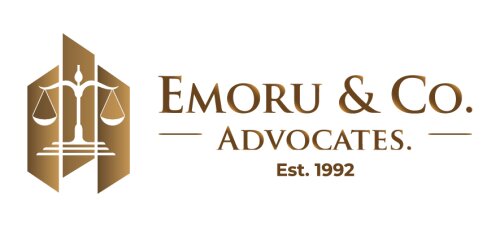Best ADR Mediation & Arbitration Lawyers in Uganda
Share your needs with us, get contacted by law firms.
Free. Takes 2 min.
Or refine your search by selecting a city:
List of the best lawyers in Uganda
About ADR Mediation & Arbitration Law in Uganda
Alternative Dispute Resolution (ADR) in Uganda, which includes both mediation and arbitration, offers a strategic and efficient way to resolve disputes outside the traditional courtroom setting. Embraced for its flexibility, ADR allows conflicting parties to reach amicable agreements while saving time and resources. The Ugandan legal system recognizes and supports ADR processes, seeing them as vital tools to ease the burden on courts and promote harmonious business and personal relationships. Governed primarily by laws such as the Arbitration and Conciliation Act, ADR practices in Uganda are increasingly gaining popularity across various sectors.
Why You May Need a Lawyer
While ADR aims to be a user-friendly and accessible means of conflict resolution, there are scenarios where legal assistance is crucial:
- Understanding Complex Legal Terms: ADR agreements and outcomes can involve intricate legal jargon that may require professional interpretation.
- Non-Compliance: If one party does not adhere to the agreed terms, a lawyer can facilitate enforcement or further legal action.
- Objective Guidance: A lawyer provides impartial advice and helps to ensure a fair process, especially when emotions run high.
- Document Preparation: Crafting clear and comprehensive agreements or arbitration clauses often requires legal expertise.
- Conflict of Interest: Lawyers can help identify and manage conflicts of interest that might jeopardize the legitimacy of the ADR process.
Local Laws Overview
Uganda's ADR landscape is shaped by several key legal provisions:
- The Arbitration and Conciliation Act: This Act provides the framework for arbitration and defines key procedures, making it a cornerstone for understanding rights and responsibilities in ADR.
- Recognition and Enforcement of Foreign Arbitral Awards: Uganda is a signatory to the New York Convention, which ensures that international arbitral awards can be recognized and enforced within the country.
- Role of Institutions: Organizations such as the Centre for Arbitration and Dispute Resolution (CADER) play a crucial role in facilitating and overseeing arbitration processes in Uganda.
- Legal Representation: While individuals can represent themselves, having a lawyer can greatly impact the effectiveness and efficiency of the process.
Frequently Asked Questions
What is ADR?
ADR stands for Alternative Dispute Resolution, referring to methods like mediation and arbitration used to settle disputes without going to court.
What is the difference between mediation and arbitration?
Mediation involves a neutral third party helping disputants reach a mutual agreement, whereas arbitration involves a neutral party making a binding decision after hearing all sides.
Is an arbitrator's decision final?
Yes, an arbitrator's decision is typically binding and has legal standing similar to a court judgment.
How is mediation different from going to court?
Mediation is less formal, more cost-effective, and allows the parties to come to a voluntary agreement rather than a court-imposed decision.
Are ADR proceedings confidential?
Generally, yes. ADR processes like mediation and arbitration are confidential, which helps maintain privacy for the parties involved.
Can I represent myself in an ADR process?
Yes, parties can represent themselves in ADR processes, but legal representation is advisable to understand complex issues and safeguard interests.
What happens if the other party doesn't comply with the arbitrator's decision?
If a party does not comply, the aggrieved party can seek enforcement through the Ugandan courts under the Arbitration and Conciliation Act.
Is ADR suitable for all types of disputes?
While ADR can resolve many disputes, it may not be ideal for all cases, especially those requiring public attention or legal precedent.
How long does an ADR process take in Uganda?
ADR processes are typically faster than court proceedings, often concluding in a matter of weeks or months, depending on case complexity.
Can ADR agreements be appealed?
Generally, arbitration awards cannot be appealed. However, mediation agreements can be modified if both parties consent.
Additional Resources
For more assistance and information regarding ADR in Uganda, consider reaching out to:
- Centre for Arbitration and Dispute Resolution (CADER): Offers services and guidance for conducting ADR processes.
- Uganda Law Society: Provides resources and referrals for legal practitioners specializing in ADR.
- Ministry of Justice and Constitutional Affairs: Offers insights into the legal framework governing ADR.
Next Steps
If you need legal assistance in ADR mediation and arbitration, consider the following steps:
- Consult with a legal expert specializing in ADR to evaluate your situation and discuss potential options.
- Prepare and organize all relevant documents and details pertaining to your case.
- Engage with ADR institutions such as CADER to find a suitable mediator or arbitrator for your dispute.
- Ensure you understand all aspects of the ADR process and clarify any uncertainties with your legal advisor.
- Follow through with all recommendations and prepare adequately for mediation or arbitration sessions.
These steps will help you navigate ADR processes effectively, ensuring your interests are well-represented and protected.
Lawzana helps you find the best lawyers and law firms in Uganda through a curated and pre-screened list of qualified legal professionals. Our platform offers rankings and detailed profiles of attorneys and law firms, allowing you to compare based on practice areas, including ADR Mediation & Arbitration , experience, and client feedback.
Each profile includes a description of the firm's areas of practice, client reviews, team members and partners, year of establishment, spoken languages, office locations, contact information, social media presence, and any published articles or resources. Most firms on our platform speak English and are experienced in both local and international legal matters.
Get a quote from top-rated law firms in Uganda — quickly, securely, and without unnecessary hassle.
Disclaimer:
The information provided on this page is for general informational purposes only and does not constitute legal advice. While we strive to ensure the accuracy and relevance of the content, legal information may change over time, and interpretations of the law can vary. You should always consult with a qualified legal professional for advice specific to your situation.
We disclaim all liability for actions taken or not taken based on the content of this page. If you believe any information is incorrect or outdated, please contact us, and we will review and update it where appropriate.
Browse adr mediation & arbitration law firms by city in Uganda
Refine your search by selecting a city.















